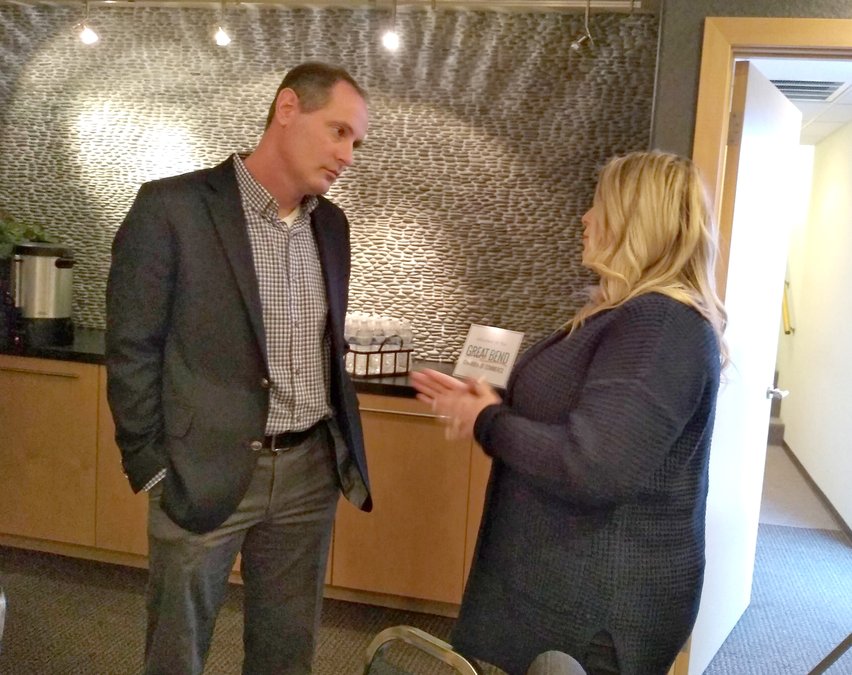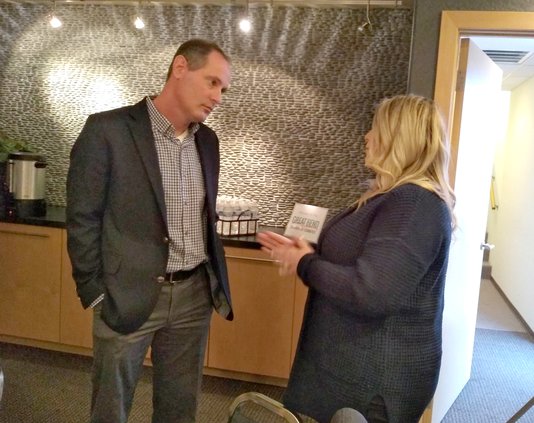In the first of eight scheduled town hall meetings Wednesday morning, 1st District Rep. Tracey Mann addressed a variety of concerns for gathered constituents at the Great Bend Chamber of Commerce office.
Mann, the freshman congressman from Salina who was born and raised near Quinter, tackled several topics; however, concerns about lingering labor issues, as well as immigration and national security topped the lists of many of those gathered for the meeting.
Mann, who serves on the U.S. House of Representatives Agriculture, Veterans Affairs, and Oversight and Investigations committees, updated the audience on his work, and trends he is seeing in Washington, D.C.
In particular, he said he is concerned about extensive land and environmental regulations coming down from the Biden administration that he feels are detrimental to constituents in Kansas’s Big First district. Mann said he introduced legislation to do away with the administration’s “30 by 30” executive orders, an effort by the administration to designate 30% of the nation’s land and ocean territories as protected by the year 2030.
Mann also opposes federal efforts to mandate the COVID-19 vaccine. In the health-care industry, particularly, Mann believes the mandate efforts are contributing significantly to labor shortages both in the area and across the country. “It’s time for free Americans to decide whether they want to get vaccinated or not. The federal government has no business mandating vaccines.”
In an effort to advocate for the future of agriculture in the U.S., Mann said he and Rep. Jimmy Panetta (D-Calif.) began the Future Farmers of America (FFA) Caucus in the U.S. House, a bipartisan group that now has 35-40 members. “We need to do all we can do to support things like FFA and ag education, and really think about the future of agriculture, and the future of this district.”
Addressing constituent concerns
As Mann opened the floor for questions, at the top of many minds were labor and immigration issues.
Audience member Don Sweeney, for example, expressed concerns the administration was turning a blind eye to unchecked illegal immigration and other pressing issues while unfairly, he believes, jailing “hundreds of Americans” for the Jan. 6, 2021 incident at the U.S. Capitol.
“We’re talking about all this other crap here, and the country’s falling apart,” Sweeney said. “We’re arranging the chairs on the Titanic.”
Mann, in response, told the audience of a trip he took with a delegation of freshmen representatives to McAllen, Texas, on the southern border of the United States, to get a first-hand account of the border situation.
“It left me both outraged and heartbroken,” Mann said. “Outraged over the change in policy, and heartbroken for what we’re doing for these (immigrant) kids.”
Mann was critical of the Biden administration’s immigration policies, which have “opened the floodgates” to illegal immigration, particularly for minors who he said are trafficked by Mexican cartels by the hundreds of thousands prior to entry into the U.S. The cartels are benefitting financially, in the hundreds of millions of dollars, while the minors become victims of what he believes is flawed policy.
Concerns over immigration policy also bled over into another hot topic for the morning’s discussion, labor shortages being experienced in multiple industries throughout the area and across the nation.
Chris Wagner with the Great Bend Co-Op, for example, said sensible immigration policy is vital in the agriculture industry, which is heavily dependent on the labor pool created by legal immigration. Largely because of the current immigration crisis, he said, agricultural employers throughout the central United States are experiencing heavy staffing shortages.
“I think the holdup is, when you see what is happening at the border, it’s impossible to even have the conversation on what our policy should be,” Mann responded. “Step one, we’ve got to secure the border, step two, we’ve got to decide as a country, what is the amount of immigration we want to see into our country and what’s the policy around making that happen?”
Jim Blackwell, CEO of Clara Barton Hospital, who attended the meeting virtually, expressed concern over staffing shortages in the health-care industry, and the high costs being experienced by hospitals using staffing agencies to shore up those shortages.
In addition to closely examining the operations of those staffing industries, Mann said, he also wants to address health-care staffing shortages through other means, including improving training for health-care workers, and removing the COVID-19 vaccine mandates for health-care staff.
Other issues
• Great Bend City Administrator Kendal Francis, who was in attendance, said the city is keeping an eye on the infrastructure bill being debated in Congress, with the city having multiple infrastructure needs to be addressed.
In particular, Francis said, the city has lingering issues with storm-water drainage from 2018-19 flooding issues. Though the city has been able recover some of the costs from FEMA, he said to properly assess the problems, then fix the issues properly, the city is looking at potentially millions of dollars in expenses. Francis is keeping a close eye on any federal assistance that might become available to address the issue.
• In response to concerns about abortion rights from League of Women Voters President Janice Walker, Mann addressed a case before the Supreme Court determining the constitutionality of a 2018 Mississippi law banning most abortions after 15 weeks of pregnancy. Walker was concerned a Supreme Court ruling in the state’s favor would undo the 1973 Roe v. Wade ruling, restricting women’s reproductive rights.
Mann told Walker, should the court rule in the state’s favor, effectively overturning Roe v. Wade, it would move abortion law from the federal level back to the state level. This would allow states to decide for themselves what laws ought to be regarding abortion.
• Others expressed concerns over the rising prices of agricultural commodities, particularly as a result of foreign involvement in the agriculture industry.
Mann agreed, saying foreign investment through the purchase of domestic land and agricultural products is hurting the industry. He believes more oversight is necessary of foreign entities that invest in the domestic agricultural industry. In other industries, this is done through the Committee on Foreign Investment in the United States (CFIUS); however, in the past the ag industry has been exempt from the committee’s legal requirement of oversight of foreign investment. He said the ag industry needs to be included in the committee’s foreign oversight efforts, and he has introduced legislation in this regard.
• Mann made particular note of Chinese ownership in ag and other key U.S. industries, something he said is dangerous for the U.S. going forward. “Make no mistake, China is not our friend.” In particular, he said Chinese involvement in technological, agricultural, and medicine production as issues of particular concern to the future security of the U.S.
• In closing, he encouraged anyone with any other questions on pending legislation or needing assistance on other particular issues to contact his offices.





